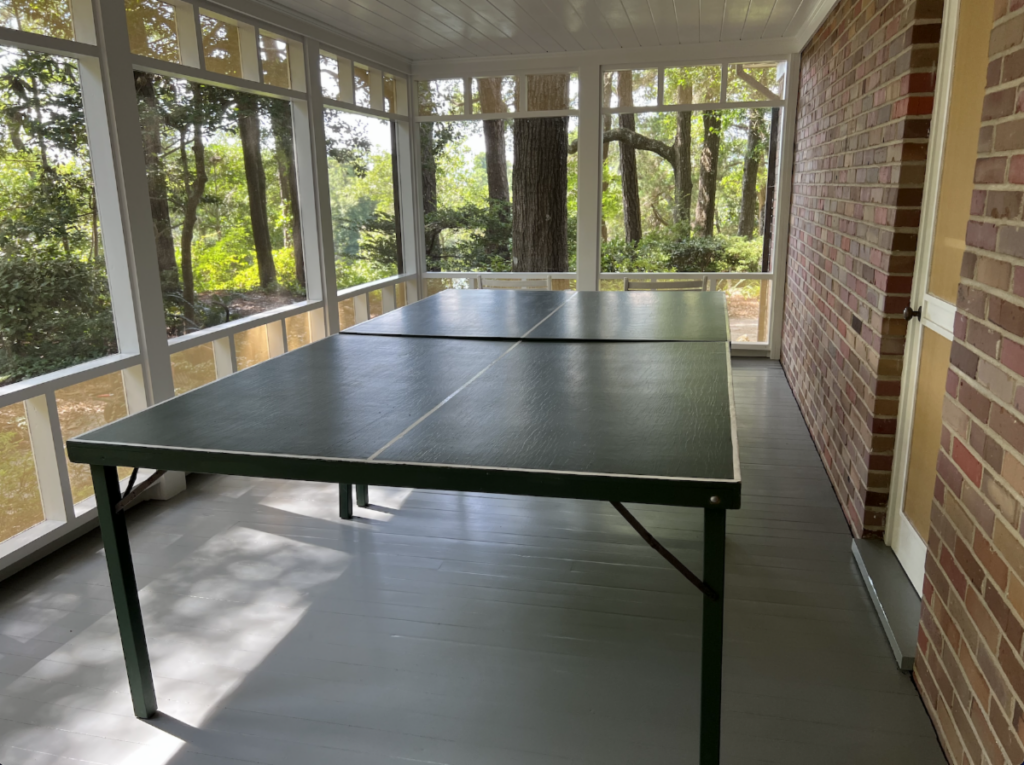
July 29, 2022
“Messiah who adores Ping-Pong”
The Sunday Mercury published in Birmingham England, June 12, 1932, ran an article entitled, “The Silent Man ‘Messiah’ who Adores Ping-Pong”. The article read, “Meher Baba is a vegetarian, teetotaler and non-smoker, wears long hair and a plush blazer and plays an excellent game of ping-pong.”
Meher Baba did indeed enjoy a good game of ping-pong. It often appeared to His opponents that He was absorbed in much more than a simple game of table tennis. Here are several of the many stories of Meher Baba and His enjoyment of the game.
In 1923 a ping pong table was set up in Manzil-e-Meem, Baba’s early ashram in Bombay. Dr. Ghani, Meher Baba’s childhood friend and early Mandali would often play a lively game with Baba. He was one of Baba’s fiercest competitors.
Will Backett, one of Meher Baba’s early English disciples, described Baba’s style: “At the ping-pong table provided for our relaxation, He was a doughty opponent, with unique grace and speed.” [I]
William Donkin, author of The Wayfarers and Mandali member wrote, “He plays very fast, hitting the ball hard. No rules, no scoring: he says the ball, racquets, talk and play are all “Chanji”, which means higgledy-piggledy.” [II] Chanji also happened to be the name that Baba gave His devoted first secretary, Framroze H. Dadachanji.
During the later part of April 1932, Meher Baba and companions from East and West traveled by train through France to Lugano, Switzerland. Kitty Davy recalled, “Baba always loved some kind of exercise and so we procured a ping-pong table from a neighboring house which the hotel put on the landing outside our rooms. Here we all played frequently at any hour of the day. Dr. Ghani gave Baba the best game…”
”Before we had our own ping-pong table, we would go to another hotel and play there. Baba enjoyed this too, but He played one day with a professional who wanted to keep score. This did not please Baba. He played when he wanted to work, doing the two simultaneously, hence scoring to Him was a hindrance. The quicker the game, the better for His work.” [III]
On Thanksgiving Day 1969, Kitty Davy gave a talk at the Center where she recalled that time in Switzerland. “We played games, and Ping-Pong was one of them. In the midst of our laughing and happy, carefree mood, Baba quietly put down the Ping-Pong bat, walked across the room and took down from the hat stand in the corner a black silk top hat. Holding it with the hollow going away from us and with Dr. Ghani interpreting, He then said, ‘This way you look outward’; turning the hat around, He then said, ’Now you look inwards – you must learn to look within. There you will find Me in the heart. You will experience My Real Being – Infinite Love.’” [IV]
Rano Gayley was one of the fortunate ones who accompanied Meher Baba on the S.S. Majestic on its voyage from Cherbourg to New York. Rano and Baba played ping-pong every morning. She recorded, “He didn’t ‘play’ table tennis in the usual sense of the word, rather he simply swatted balls at you as hard as he could and you had to be alert enough to return them. Whatever Baba’s internal work was at the time, it must have been particularly strenuous, judging from the force he put on the ball.” [v]
In the summer of 1956, fourteen year old Peter Thibodeau, was helping out doing odd jobs at Meher Center. Peter had noticed the ping-pong table at Baba’s house and asked Baba if he and Baba could play a game. When He had time, Baba sent Adi to fetch Peter and the two played ping-pong. As usual, Baba won!
Now, sixty-six years later, the ping pong table is preserved on the porch at Baba’s House and is available for viewing only. Day visitors and overnight guests are welcome to play ping-pong in the Recreation Room. There you can play a game, practice your forehand fast serve or be like Baba and not keep score.
On Silence Day Eve, 1979 Kitty Davy gave a talk at the Center. She said, “Looking back, however, I realize that above all other aspects of our early years with Baba, in India and in the West, there was one fine thread that went into or onto the canvas, and that fine thread, as I see it today, concerned consciousness. Baba silently and continuously was working on this one theme, consciousness.
“Why, for instance, did He so frequently call us to be with Him, to sit with Him, to play various games with Him? Ping-Pong, volleyball, and numerous card games. And His various disciplines, His occasional orders, His assigned duties — why? He was working to try to bring consciousness away from self and away from the many objects of illusion and duality — its wants and desires —to the one object, Himself.”[VI]
[I] Three Incredible Weeks ,by Malcolm Schloss and Charles Purdom, p. 157
[II] “My Days with the Master,” by William Donkin, Awakener Magazine, Vol 20 No 2, p. 6
[III] Love Alone Prevails, by Kitty Davy, p. 57-58
[IV] One Fine Thread, by Kitty Davy, p.18-19
[V] Because of Love, by Rano Gayley, p. 8
[VI] One Fine Thread, by Kitty Davy, p. 111-112